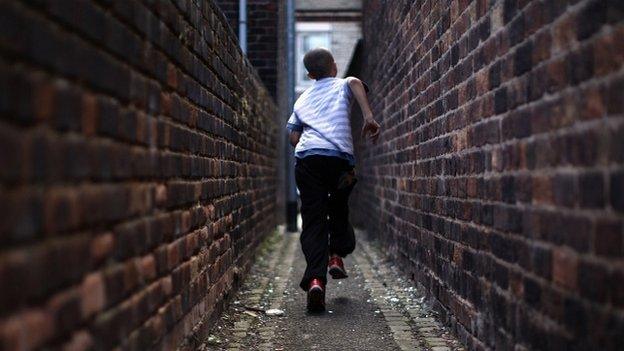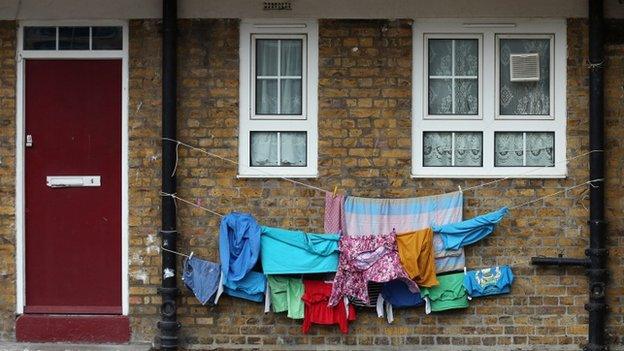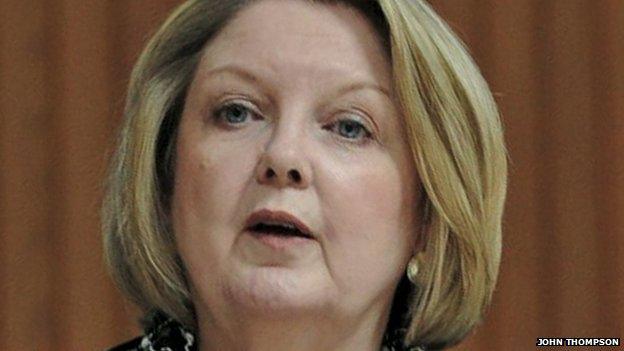Teachers warn of 'Victorian' poverty among pupils
- Published
- comments

Teachers say schools are having to "pick up the pieces" from families in financial hardship
Teachers say they are seeing "Victorian conditions" with pupils arriving at school hungry and not wearing the right clothes needed for the weather.
The NASUWT teachers' union says schools and teachers are increasingly having to deal with the consequences of poor housing and poverty.
Teachers reported bringing in their own food to school to give to children.
The Conservatives said the number of children in poverty had fallen by 300,000 under the coalition government.
The Liberal Democrats said they had helped families by introducing free school meals for all infant children.
Tristram Hunt, Labour's shadow education secretary, warned of the "quiet indignity of poverty that can wreak havoc with a child's confidence".
He said poverty was one of the "biggest barriers" to pupils achieving in school.
Socks and coats
Claims about poverty in the school-age population were heard at the NASUWT teachers' union annual conference in Cardiff.
The union asked members for their experiences and received almost 2,500 responses.

Teachers say schools have to cope with the wider consequences of poverty
It was not a representative sample of teachers, but among those replying more than two in three reported seeing pupils come to school hungry.
"Children in 2015 should not be hungry and coming to school with no socks on and no coats - some children are living in Victorian conditions - in the inner cities," said one unnamed teacher.
Almost one in four of the teachers who responded said they had brought in food for pupils who were hungry, and an even higher proportion had seen the school feeding pupils.
More than three in four had seen pupils arriving at school with "inappropriate clothing" such as no socks or coats in bad weather.
Similar numbers claimed that a bad diet meant that pupils were unable to concentrate on their work.
More children were being sent home with letters about unpaid school meals and pupils who were sick were still being sent to school because parents could not afford to take time off work, claimed teachers.
The comments from the survey suggest teachers felt that they were having to cope with the wider problems linked to family hardship, such as children living in temporary accommodation or relying on food banks.
Healthy food
"Poverty and homelessness take a physical and emotional toll on children. They often cannot concentrate when they are in school because they are tired and hungry, have no space to do homework," said NASUWT general secretary Chris Keates.
"Schools cannot be expected to pick up the pieces."

NASUWT leader Chris Keates says poverty takes a heavy emotional toll on children
Speaking at her own union's conference in Harrogate, National Union of Teachers president Philipa Harvey said: "Many of us will have provided breakfast for children so that they can cope with the demands of a school day as well as the teachers and other staff who are providing school uniform, books, coats."
A Liberal Democrat spokesman said that as part of the coalition government they had introduced "free early years education for the poorest two year olds, and free school meals for all infant children".
"We agree that there is more to do to ease the squeeze on family budgets and build a fairer society. We will cut income tax by a further £400 for low and middle earners, and ensure more families can access free childcare.
"Free school meals help children learn, make sure children eat more healthy food, and save parents money. So we will also aim to extend free school meals to all children in primary school."
A Conservative spokesman said under the coalition government "the number of children living in poverty has fallen by 300,000".
He added that because of the pupil premium, the poorest pupils are getting an extra £2.5bn targeted at their education each year, which is already closing the attainment gap with their peers.
"Because of our policies, there are more jobs than ever before, wages are rising faster than prices and with the lowest inflation on record, family budgets are starting to go further.
"The NASUWT should recognise how the Conservatives have rescued the economy, and through that, delivering the jobs that secure a better future for families."
Labour's Tristram Hunt, speaking to the NASUWT conference, had pledged that Labour would renew the aim to eradicate child poverty by 2020.
He told delegates: "If a child has no food to eat, no safe and warm space to call their own, no books to read, no uniform to wear, no money for transport to school, then that child cannot possibly be learning at their full potential."